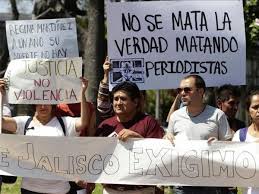Reporters in Latin America are regularly targeted by threats, harassment, and murder, according to an annual report by Reporters Without Borders, raising questions about how press freedom, or a lack thereof, can intersect with organized crime.
According to the list, the worst five countries for press freedom in Latin America are Cuba, Mexico, Venezuela, Honduras and Colombia. Mexico ranked lower than the harsh military dictatorship in Myanmar, while Cuba even appears below Saudi Arabia, which maintains a notoriously severe journalistic environment.
While in some Latin American countries, such as Cuba, Venezuela and Ecuador, press freedom is mainly limited by government censorship, in others it is driven by organized crime. Journalists who try to reveal collusion between governments and criminal groups in the likes of Mexico, Colombia, Guatemala and Honduras are often targeted with impunity, leading to self-censorship, according to the report. The situation is exacerbated by weak and underutilized mechanisms to protect journalists in countries where governments don’t overtly censor the press, as highlighted by a recent report from the Washington Office on Latin America.
InSight Crime Analysis
When analyzing the effect of organized crime on the press, Mexico and Colombia stand out. Eighty-one journalists in Mexico and 56 in Colombia were murdered between January 2000 and September 2014 (the infographics below only show murders where motive could be proved), the two deadliest countries for journalists in Latin America.

It is often local journalists and citizen reporters who are in most danger, as they enjoy minimum protection and operate in the areas where they expose criminal activity or official corruption.
In one notable case in Mexico, a woman reporting for a citizen information service was kidnapped and killed in October 2014, after which pictures of her body were posted to her twitter account with the caption “shut down your accounts.” The same network was targeted the year before, when a criminal group offered $45,000 for information on the administrator of the service.
SEE ALSO: Mexico News and Profiles
In August 2014, Colombian journalist Luis Carlos Cervantes was murdered, having previously received threats for his reporting on corruption in the region he was working, just weeks after his government-supplied protection had been withdrawn.

Meanwhile, in Colombia, right-wing paramilitary successor groups like the Aguilas Negras, or Black Eagles, regularly threaten journalists. The Aguilas Negras named 14 journalists over a period of four days in December 2014, demanding they leave the cities where they operate. In August 2014, the same group told freelance photographer and indigenous rights activist Juan Pablo Gutierrez he had “just a few hours of life left,” forcing him to flee his home, according to Reporters Without Borders.

